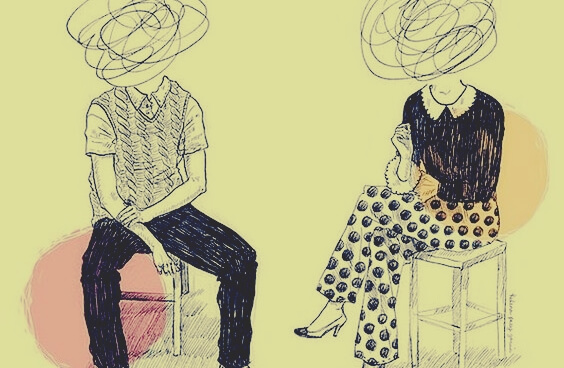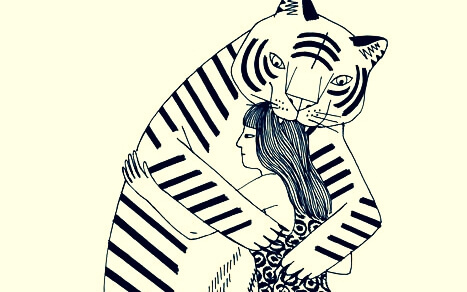How to Know if You Have a Toxic Friendship

A toxic friendship is not one-sided. The toxic part always refers to at least two. In some cases, the two involved in these types of friendships have obvious toxic behaviors. In other cases, one of the two is an active agent and the other is passive. The latter almost always having very low self-esteem. The truth is that it is not a question of good and bad, but rather of inadequate and destructive relationships and ways of relating to each other.
The Orientals have a maxim that may seem very obvious, but which exhibits great wisdom: “Like always seeks like”. In human relationships, either consciously or unconsciously, we seek and attract those who have strengths and weaknesses similar to our own. It is uncommon for someone with a high mental health to end up getting involved with a very neurotic or “toxic” person. Perhaps it is the low self-esteem and continued belittling or harsh treatment received in childhood that causes a person to get together with someone who creates a toxic friendship.
“What makes friendship inextricable and doubles its charm, is a feeling that lacks love: certainty.”
-Honoré de Balzac–
Nobody is so unattractive that they must be escaped from. Neither is anyone so perfect that they live without making a single mistake or don’t have aspects to improve. A toxic friendship is a destructive one, and both provide the poison.
Sometimes it is about changing the relationship. Other times there is no choice but to break it. The important thing is to learn to identify what symptoms reveal an inadequate relationship. Here are some of them.
In a toxic friendship there are systematic disparaging comments
Toxic friendship is common among people with low self-esteem. One of the most damaging aspects of these types of relationships are the disparaging comments that aren’t expressed explicitly, but rather in a disguised manner. If they were said openly, they would possibly lead to a distancing. That is why subtleties, ironies, sarcasms and hidden messages are used.

The content of these messages is aggressive. They seek to diminish the value of the other person or their achievements. In a toxic friendship there is an ambivalence: one is friend and enemy at the same time. There is closeness and distance at the same time. To keep this double game going, hidden criticisms are very usual. What normally happens is that it comes from both sides and that they keep it going. The two people are hurting themselves, but they manage to cover it up.
Friendship, or guilty by association?
There are friends with whom you always seem to end up breaking some rule or another. This happens with people whose relationship is based on the consumption of alcohol or some other addictive substance. There are also cases where the relationship is maintained in order to cover up infidelities, avoid obligations or indulge in excesses. It’s a clear case of aiding and abetting and getting into bad company.

In this case the friendship is toxic because the “friend” is only a vehicle to support behaviors that are far from positive. Neither is interested in the welfare of the other. They simply use each other to bring out inappropriate aspects of their personalities. This type of friendship usually finishes when one of the two wants to improve their life. In fact, the other person will try everything possible to prevent this from happening, because, if not, they’ll be left without their partner in crime.
You constantly feel bad
An unmistakable symptom of a toxic friendship is the sensation that remains after spending time with that person. Sometimes you perceive a kind of heaviness. You feel emotionally exhausted. You may experience some irritation, but you can’t clearly identify the cause. Feelings of guilt and sadness can also occur.
Most likely there is a whole network of unconscious symptoms that come together. That’s why you feel bad after being with that person and yet, strangely, you can’t end the friendship. The union between the two is neurotic and depends on unconscious feelings or desires. The truth is that all of this distresses you, but it is as if it were inevitable to live the same experience over and over again.
Everything revolves around a negative vision
There are friends who get together and always transmit negativity. Sometimes it is with scathing criticism of other people. In this type of toxic friendships gossip, intrigue and slander about others are freely bandied about. They share points of view that belittle others and that nourish pre-existing conflicts. They reinforce each other’s attitudes and that unites them.

In other cases complaints fill the air. It is not so much that they are seeking a shoulder to cry on. What they do is to fight to see who is the most unfortunate victim or reinforce each other’s feelings of being victimised. They mull over their difficulties and lament them, but don’t show any desire to get over them. Quite the opposite. They love their wounds and take care of each other’s, but they are not interested in healing them.
There is no reciprocity.
A healthy friendship is based on the foundations of reciprocity and balance.
However, there are people who only look for their friends to demand things of them or to ask them for things. They see themselves as people who need a lot from others. And, using the same logic, others have the implicit obligation to give. In many cases they don’t realize they are like that, because their egocentricity prevents it. The lack of reciprocity shows itself when, for example, it is only one who speaks, while the other one has to just listen. Or when one of the two feels that their problems are undoubtedly more important and of a higher priority than the other person’s. It is also frequently the case that when someone is in trouble, their friend disappears. You can only count on him when everything is going perfectly.
A toxic friendship takes much more than it gives. Actually, it has little to do with friendship. Maybe there is a genuine mutual affinity, but the way the relationship is structured and lived out makes it harmful to both. The other person is not the only problem, it is also the one who tolerates this kind of relationship passively.

We always end up looking a little like the people we spend time with. If our goal is to be better and better, to grow and to protect our well-being, it is important that we choose the type of people we build a friendship with.
Image courtesy of Amèlie Fontaine
A toxic friendship is not one-sided. The toxic part always refers to at least two. In some cases, the two involved in these types of friendships have obvious toxic behaviors. In other cases, one of the two is an active agent and the other is passive. The latter almost always having very low self-esteem. The truth is that it is not a question of good and bad, but rather of inadequate and destructive relationships and ways of relating to each other.
The Orientals have a maxim that may seem very obvious, but which exhibits great wisdom: “Like always seeks like”. In human relationships, either consciously or unconsciously, we seek and attract those who have strengths and weaknesses similar to our own. It is uncommon for someone with a high mental health to end up getting involved with a very neurotic or “toxic” person. Perhaps it is the low self-esteem and continued belittling or harsh treatment received in childhood that causes a person to get together with someone who creates a toxic friendship.
“What makes friendship inextricable and doubles its charm, is a feeling that lacks love: certainty.”
-Honoré de Balzac–
Nobody is so unattractive that they must be escaped from. Neither is anyone so perfect that they live without making a single mistake or don’t have aspects to improve. A toxic friendship is a destructive one, and both provide the poison.
Sometimes it is about changing the relationship. Other times there is no choice but to break it. The important thing is to learn to identify what symptoms reveal an inadequate relationship. Here are some of them.
In a toxic friendship there are systematic disparaging comments
Toxic friendship is common among people with low self-esteem. One of the most damaging aspects of these types of relationships are the disparaging comments that aren’t expressed explicitly, but rather in a disguised manner. If they were said openly, they would possibly lead to a distancing. That is why subtleties, ironies, sarcasms and hidden messages are used.

The content of these messages is aggressive. They seek to diminish the value of the other person or their achievements. In a toxic friendship there is an ambivalence: one is friend and enemy at the same time. There is closeness and distance at the same time. To keep this double game going, hidden criticisms are very usual. What normally happens is that it comes from both sides and that they keep it going. The two people are hurting themselves, but they manage to cover it up.
Friendship, or guilty by association?
There are friends with whom you always seem to end up breaking some rule or another. This happens with people whose relationship is based on the consumption of alcohol or some other addictive substance. There are also cases where the relationship is maintained in order to cover up infidelities, avoid obligations or indulge in excesses. It’s a clear case of aiding and abetting and getting into bad company.

In this case the friendship is toxic because the “friend” is only a vehicle to support behaviors that are far from positive. Neither is interested in the welfare of the other. They simply use each other to bring out inappropriate aspects of their personalities. This type of friendship usually finishes when one of the two wants to improve their life. In fact, the other person will try everything possible to prevent this from happening, because, if not, they’ll be left without their partner in crime.
You constantly feel bad
An unmistakable symptom of a toxic friendship is the sensation that remains after spending time with that person. Sometimes you perceive a kind of heaviness. You feel emotionally exhausted. You may experience some irritation, but you can’t clearly identify the cause. Feelings of guilt and sadness can also occur.
Most likely there is a whole network of unconscious symptoms that come together. That’s why you feel bad after being with that person and yet, strangely, you can’t end the friendship. The union between the two is neurotic and depends on unconscious feelings or desires. The truth is that all of this distresses you, but it is as if it were inevitable to live the same experience over and over again.
Everything revolves around a negative vision
There are friends who get together and always transmit negativity. Sometimes it is with scathing criticism of other people. In this type of toxic friendships gossip, intrigue and slander about others are freely bandied about. They share points of view that belittle others and that nourish pre-existing conflicts. They reinforce each other’s attitudes and that unites them.

In other cases complaints fill the air. It is not so much that they are seeking a shoulder to cry on. What they do is to fight to see who is the most unfortunate victim or reinforce each other’s feelings of being victimised. They mull over their difficulties and lament them, but don’t show any desire to get over them. Quite the opposite. They love their wounds and take care of each other’s, but they are not interested in healing them.
There is no reciprocity.
A healthy friendship is based on the foundations of reciprocity and balance.
However, there are people who only look for their friends to demand things of them or to ask them for things. They see themselves as people who need a lot from others. And, using the same logic, others have the implicit obligation to give. In many cases they don’t realize they are like that, because their egocentricity prevents it. The lack of reciprocity shows itself when, for example, it is only one who speaks, while the other one has to just listen. Or when one of the two feels that their problems are undoubtedly more important and of a higher priority than the other person’s. It is also frequently the case that when someone is in trouble, their friend disappears. You can only count on him when everything is going perfectly.
A toxic friendship takes much more than it gives. Actually, it has little to do with friendship. Maybe there is a genuine mutual affinity, but the way the relationship is structured and lived out makes it harmful to both. The other person is not the only problem, it is also the one who tolerates this kind of relationship passively.

We always end up looking a little like the people we spend time with. If our goal is to be better and better, to grow and to protect our well-being, it is important that we choose the type of people we build a friendship with.
Image courtesy of Amèlie Fontaine
All cited sources were thoroughly reviewed by our team to ensure their quality, reliability, currency, and validity. The bibliography of this article was considered reliable and of academic or scientific accuracy.
- Felmlee, D., & Faris, R. (2016). Toxic Ties: Networks of Friendship. Social Psychology Quarterly, 79(3), 243–262. https://doi.org/10.1177/0190272516656585
- Sternberg, RJ (2018). Sabiduría, insensatez y toxicidad en el desarrollo humano. Investigación en Desarrollo Humano, 15 (3-4), 200-210.
This text is provided for informational purposes only and does not replace consultation with a professional. If in doubt, consult your specialist.







